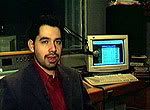
I am happy to announce that the founder of the popular internet radio service, Digitally Imported, has agreed to participate in an interview with Web Publishing Blog.
Digitally Imported began in 1999 as an electronic music station and has since expanded to include genres from classical to reggae.
Andrew: When did your interest in electronic music and internet radio begin, and how did the two converge?
Ari: I guess I’ve always liked that kind of music whenever I’ve heard pieces of it here and there. The main problem is that there was not much exposure for it at all in the United States. So I didn’t really know for sure that I liked so much of it until years later. When I entered college and got broadband in my dorm room, it didn’t take long to find the new music on the net. Around that time I also found Shoutcast.com and started toying around with streaming radio right out of the college dorm room. Hey, an AMD 200Mhz box can host only so many listeners in a college dorm room on it! But that’s where it started, right after the box kept freezing because too many listeners would connect to hear the Trance and Eurodance picks I’ve selected for them to hear in those days.
Andrew: With such a wide variety of global artists being played on Digitally Imported, how difficult is it to manage copyright and royalty payment issues?
Ari: It’s kind of a pain to deal with the bureaucracy of it - a pain and a drain It can be a barrier to entry for some folks wanting to get into the space based on all the confusion. But at least one thing was made easy is that in the US we only have to pay recording royalties to one organization which redistributes to artists, and that organization being SoundExchange. There are other companies for songwriters and musicians such as ASCAP, BMI, SESAC, it gets a little more involved there at times.
Andrew: From the technical side of things, how many servers do you have and what kind of bandwidth are you doing on average?
Ari: I can’t go into too many details, but we have a few dozen of servers here and there so far. We use a few Gbits of bandwidth per second on our radio network.
Andrew: For someone considering starting their own internet radio station, do you have any advice or resources you would direct them towards?
Ari: Yes, find another hobby, this one takes long to grow! I am in it already and I love it, but it takes time to get on its feet for sure.
Andrew: 10 years from now, do you see yourself still in internet radio or having moved on to something else?
Ari: I can’t imagine myself in the mirror 10 years from now. Online 10 years is a lifetime. I definitely imagine Digitally Imported continuing to be a strong brand in its niche and even expanding into other things besides radio. But 10 years is a long time, all this might be in video by then! As for me personally I couldn’t comment on what I’d be doing, too many ideas.
Andrew: Right now di.fm ranks on the first page of Google for terms such as “online radio”, “electronic music” “trance.” Was there ever any intentional search engine optimization of the site?
Ari: No we haven’t done any at all actually. Just good old word of mouth over the last 7 years.
Andrew: Is there any pending US legislation which you believe would threaten online radio?
Ari: Yes, actually the royalties to SoundExchange are not agreed upon at this time, since it runs out every few years. Some want it to be as high as 30% of the revenue, which would put us out of business. There’s legal stuff going on now trying to sort it out. But perhaps worse of all is not something that is pending but something passed. I am talking about the DMCA, it’s a horrible piece of legislation and really limits the way we can creatively make services online available to all.
http://www.webpublishingblog.com/interv ... -radio.htm



